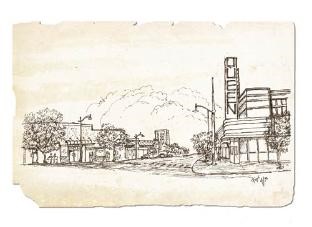Care must be taken to preserve Kaimuki’s quaint character
By Robert M. Fox and David Cheever / Special to the Honolulu Star-Advertiser, April 7, 2013

The Queen Theater closed in 1987, but the 1930s marquee remains a landmark in Kaimuki. (Illustration by Robert M. Fox)
Most of us who live in Honolulu usually crest the hill on Waialae Avenue only to get from one place to another. We never give a thought to the neat community that surrounds that hill — Kaimuki. But slow down for a moment and think about this description of Kaimuki from an outside perspective: “Kaimuki is a quaint town with cozy shops and a smattering of good and affordable restaurants. It is walkable. It is low key,” according to a guidebook called Daytrips Hawaii.
That’s pretty nice, especially in view of the bustle and hustle of many other Oahu neighborhoods. And there’s a lot to recommend in Kaimuki besides the shops and eateries. For instance, there are pleasant tree-lined sidewalks and the community park on the town side of the Kaimuki hill. Most days you can see moms with kids in strollers chatting with each other. Seniors sun themselves on the ample benches. And the community center attached to the park attracts hula lessons, lei-making and other assorted activities.
Kaimuki has several landmarks many of us may miss as we zip along Waialae or other streets in the neighborhood. At the base of the hill above the main drag is the old fire station, built in 1924. It is a classic Spanish/mission style, according to Historic Hawai‘i. Above the fire station is another park that sees less use than the one on Waialae, but nevertheless has great views.
How many people know about the sizable stone-and-brick reservoir still standing on the same hill? The early developers of Kaimuki, Theodore Lansing and A.V. Gear, faced a water problem in 1898 when they started to sell lots in hot, dry, dusty Kaimuki. So they dug two wells, brought in pipes and pumps from San Francisco and built the stone reservoir. Problem solved.
By the way, those lots were sold for three cents a square foot, or $400, in the late 1800s.
Historic Hawai‘i reports there were four heiau in the area: Maumae on Sierra Drive; one on the Honolulu side of Kaimuki Hill; another between Ocean View Drive and the old Waialae Drive-in; and a fourth apparently under the parking lot of Leahi Hospital.
Not a landmark but notable nonetheless is the annual Kaimuki Christmas Parade, which was started in 1946. With the nearest similar parade in Hawaii Kai, the festivities in Kaimuki draw from all areas of the island.
Aside from the landmarks and commercial areas of Kaimuki, the neighborhoods are still mostly filled with modest, early-20th-century homes where people walk and neighbors talk in their front yards. Many are still single-wall construction. In the early days, many of those homes were built by Lewers and Cooke or ordered through a catalog of prefabricated structures shipped from the mainland for as little as $700, according to Historic Hawai‘i.
The ups and downs of Kaimuki throughout the years have been brought about mostly by outside forces. On the positive side, around the turn of the 20th century the commercial areas were driven by the Chinatown fires when merchants moved out of that area to Kaimuki.
On the negative side was the construction of the H-1 freeway, which bisected the town and slowed commercial activity. Still, some say the freeway actually helped preserve Kaimuki as a low- to mid-rise community.
Off-street parking remains a problem that needs a long-term solution that would not affect Kaimuki’s existing village character.
The Queen Theater opened in 1936 and closed in 1987 after dwindling attendances. Today the theater is still standing with the 1930s marquee providing a landmark on Waialae Avenue.
The building should be resurrected as a restaurant featuring an interior design of old movies and historic images of Kaimuki.
All in all, Kaimuki remains a treasured and preserved spot for those of us who live on Oahu.

